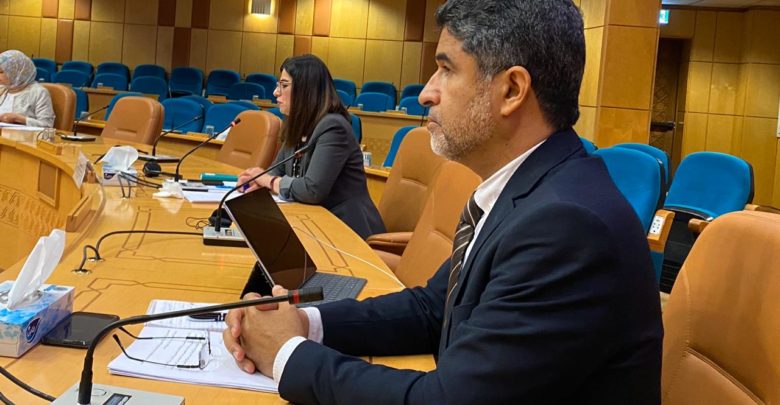
Ashraf AboArafe
Dr Ahmed Al-Mandhari, the regional director of WHO gave a statement yesterday about last update on COVID19 as follows:
Dear colleagues and friends,
Ramadan Kareem. Thank you for joining us once more as we continue our collective fight against COVID-19.
Over the past few weeks, this fight has become even more challenging with the appearance of the virus in countries such as the Syrian Arab Republic, Libya and Yemen. Decades and years of conflict — sometimes coupled with natural disasters and previous outbreaks — have left these countries with weakened health systems, shortages in health workers, and limited access to even the most basic medical care services.
Millions of already vulnerable people in these countries are also more prone to infectious diseases due to overcrowded living conditions, weakened immunity due to years of food insecurity, and insufficient treatment for other underlying medical conditions.
Many of these countries are also politically fragmented, resulting in limited humanitarian access to populations in some areas, and challenges in the sharing of information between controlling parties and WHO in a timely and transparent manner.
In Syria, partial implementation of public health measures because of economic difficulties due to war and sanctions, slow testing levels which leads to delays in detection, isolation, and contact tracing means that cases are likely to increase in the coming weeks. The situation is even more critical in areas in the northwest and northeast of the country under control by opposing forces, where we have limited humanitarian access and where hundreds of thousands of people are at greater risk.
In the northeast, where one case has so far been confirmed, there are challenges in consolidating the numbers of reported cases with those across the rest of the country, due to lack of cooperation among the different controlling authorities.
In Libya, fighting continues in Tarhouna, south of Tripoli, and shelling continues near Mitiga airport in Tripoli. Residents of greater Tripoli continue to be affected by severe water shortages. These are just some of the threats that impede our work to protect innocent people from COVID-19 and other health risks.
In Yemen — the world’s worst humanitarian disaster – more than 13 million people a month are dependent on food assistance, 2.5 million children under 5 require nutritional support, and 8.8 million require health care, making them more susceptible to contracting infectious diseases like COVID-19 due to compromised immune systems. Yemen’s health system is fragile, and the emergence of COVID-19 could be catastrophic—overwhelming already ravaged hospitals, health facilities and health care workers. Operating conditions and access in some areas across the country are restrictive, leaving millions of people exposed and vulnerable.
I would like to stress here that health is a human right. Our mandate as WHO is — and has always been — to serve all people in need of health aid, regardless of gender, race, geographic location, or political affiliation.
Our WHO representatives, staff and health partners working in these and other countries are often operating under extremely difficult conditions. But they all have one common goal: to protect the health of the people they serve and to leave the politics behind.
As humanitarians, we have no hidden agendas or bias. We abide by our core mandate that health is neutral and ensure humanitarian access for all people, everywhere.
In previous years, we have successfully advocated for health as a bridge to peace and negotiated ceasefires for vaccination campaigns and other life-saving activities. These efforts continue now as it becomes even more critical to ensure that all cases of COVID-19 are quickly identified and properly isolated and treated, and with all contacts traced to avoid further transmission.
Dear colleagues,
While the disease continues to spread across our region, there has been a slight decrease in the number of cases reported week by week in some countries. Some of these countries have developed an exit strategy and have started lifting restrictions, including easing of curfews and airport closures. Without careful planning, and in the absence of scaled up public health and clinical care capacities, this premature lifting of physical distancing measures is likely to lead to an uncontrolled resurgence in COVID 19 transmission and an amplified second wave of cases.
There has been much discussion on whether patients who have been infected with the virus are now immune to reinfection. We have limited information on whether a person infected with the virus can develop an antibody response and for how long, and there is no evidence that a serological test can show that an individual is immune to COVID-19 after having contracted the disease and recovered.
WHO is working with researchers to accelerate the development of vaccines and therapeutics for COVID-19. More than 80 vaccines are in development globally, including six vaccines in clinical evaluation, and several therapeutics are in clinical trials. A solidarity trial for vaccine development will be launched, in addition to the current trail for therapeutics.
We are committed to ensuring that as medicines and vaccines are developed, they are shared equitably with all countries and people.
Over the past four months, this pandemic has taught us all many lessons on the need for united global action to face a global threat. This is not the time for politics, accusations, or mistrust. We can only succeed by working together as nations, humanitarian, communities, and individuals, and by ensuring that our actions – based on solidarity, real partnership, mutual trust, and transparency — serve even the most vulnerable for the common good.
There is no better time than now for unity and collaboration between nations – whether stable nations or those facing conflict. Let this unprecedented pandemic be an opportunity for all to put aside their differences, find common ground, and work together for the sake of humanity.




